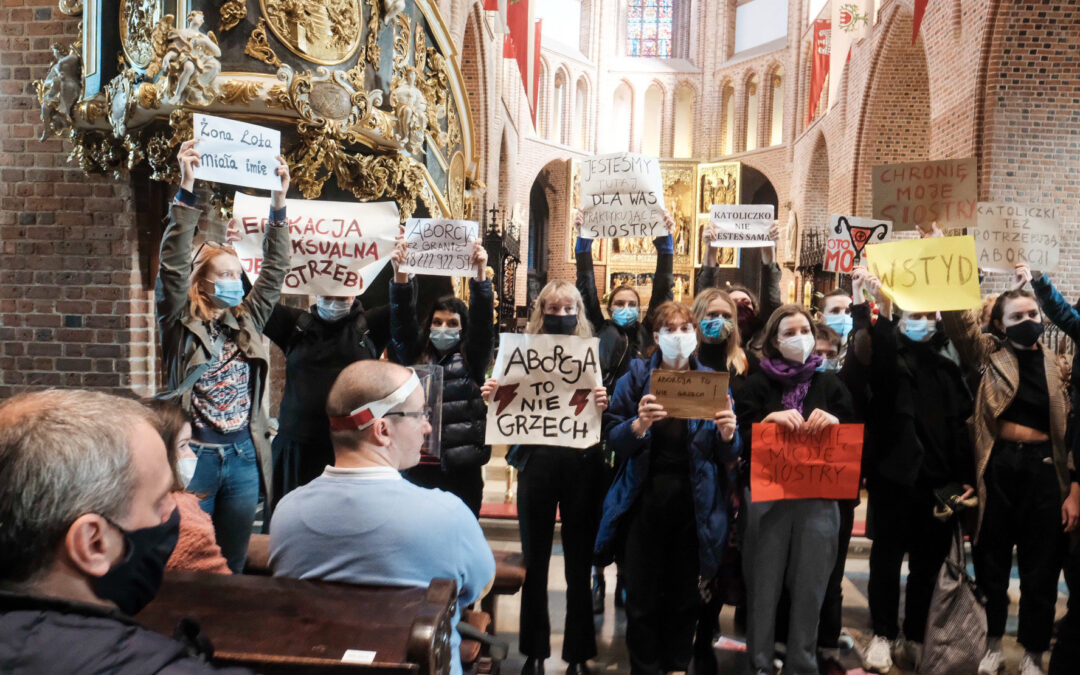The trial has begun of 32 people who protested in a church against Poland’s near-total ban on abortion. If found guilty of “malicious interference with a public performance of a religious act”, which is a crime in Poland, they could face up to two years in prison.
The protesters staged their demonstration on 25 October last year, which was the first Sunday after Poland’s Constitutional Tribunal issued a ruling that effectively outlawed almost all abortion.
The participants stood in front of the altar in Poznań Cathedral shouting “My body, my choice” and “The episcopate should stay away from politics”. They waved signs reading “Abortion is not a sin” and dropped leaflets promoting women’s right to decide on terminating pregnancies, reports Gazeta Wyborcza.
Poznań. Kobiety przerwały mszę w katedrze. Interweniowała policja. "Mamy tego dość jako katolicy". Więcej w relacji: https://t.co/LlqEGUhUBU @EpiskopatNews @Abp_Gadecki #aborcja #piekłokobiet pic.twitter.com/T5cp18RIwc
— Piotr Żytnicki (@PiotrZytnicki) October 25, 2020
The presiding priest asked them not to interfere with the ongoing mass, but this was ignored and the police were later called to end the demonstration.
Prosecutors later charged all 32 protesters with “maliciously interfering with the public performance of a religious act jointly and in cooperation”. That crime is punishable with a fine, community service, or up to two years in prison. At the start of the trial this week, all those charged have pleaded not guilty.
One of the participants, named only as Arkadiusz K. under Polish privacy laws, told the court that he was motivated by the support of church leaders for the new abortion regime. “It’s not the first time that…the Catholic church is interfering in my life and the life of my friends and colleagues,” he said, quoted by Interia.
In the wake of the abortion ruling, the archbishop of Poznań, Stanisław Gądecki – who is also the head of the Poland’s Catholic episcopate – had hailed the decision as a “historic change”. In 2019, he had publicly criticised the ruling party for failing to yet implement a campaign promise to restrict abortion.
Many of the mass demonstrations that took place in the wake of the abortion ruling – which were the largest protests in Poland’s post-communist history – targeted churches.
In response, some far-right groups and football fan organisations rallied to churches to defend them, resulting in clashes. The head of Poland’s ruling party, Jarosław Kaczyński, also called on his followers to defend churches.
A number of other legal actions have been launched against participants in the protests.
These include charges pressed against the head of the organisation that coordinated the demonstrations, Marta Lempart, for “insulting police officers by making a spitting gesture and using vulgar words” as well as for “causing an epidemiological threat”.
Poland’s prosecutor general, Zbigniew Ziobro, who is also the country’s justice minister, submitted a motion to remove the parliamentary immunity of an opposition MP so that she could be charged with “offending religious feelings” by protesting in a church.
Main image credit: Piotr Skornicki / Agencja Gazeta

Agnieszka Wądołowska is deputy editor-in-chief of Notes from Poland. She is a member of the European Press Prize’s preparatory committee. She was 2022 Fellow at the Entrepreneurial Journalism Creators Program at City University of New York. In 2024, she graduated from the Advanced Leadership Programme for Top Talents at the Center for Leadership. She has previously contributed to Gazeta Wyborcza, Wysokie Obcasy and Duży Format.




















